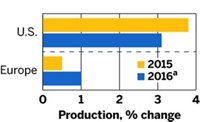Advertisement
Grab your lab coat. Let's get started
Welcome!
Welcome!
Create an account below to get 6 C&EN articles per month, receive newsletters and more - all free.
It seems this is your first time logging in online. Please enter the following information to continue.
As an ACS member you automatically get access to this site. All we need is few more details to create your reading experience.
Not you? Sign in with a different account.
Not you? Sign in with a different account.
ERROR 1
ERROR 1
ERROR 2
ERROR 2
ERROR 2
ERROR 2
ERROR 2
Password and Confirm password must match.
If you have an ACS member number, please enter it here so we can link this account to your membership. (optional)
ERROR 2
ACS values your privacy. By submitting your information, you are gaining access to C&EN and subscribing to our weekly newsletter. We use the information you provide to make your reading experience better, and we will never sell your data to third party members.
Business
Industry To Slow In U.S. And Europe
Chemical Forecast: Bright spots are overshadowed by Europe’s debt crisis and U.S. housing market
by Marc S. Reisch
December 19, 2011
| A version of this story appeared in
Volume 89, Issue 51

In its end-of-the-year assessment and outlook for the chemical enterprise, the American Chemistry Council concludes that “the recovery from the worst recession since the Great Depression has stalled.” The European Chemical Industry Council (CEFIC) is also concerned about economic growth. Both industry trade groups say chemical production in their regions will grow at a slower pace in 2012 than it did this year.

ACC’s pessimistic appraisal takes into account evidence of an emerging recession in Europe, a slowdown in the U.S. economy, and signs of less robust growth in Asia. “Is it 1937, when another recession followed a few years after the Great Depression,” asks ACC’s Chief Economist T. Kevin Swift, “or 1995, which was just a midcycle slowdown?”
The answer is likely not a simple one. Economic prospects going forward “represent a two-speed world” in which Asia outpaces other regions, write Swift and ACC colleagues who prepared the report.
Developed nations, they say, will be constrained by debt, adverse demographic factors, and tight fiscal policies that could lead to slow growth and recession. Emerging markets will continue to grow, but not as strongly as in 2010, the economists add.
After a strong rebound in 2010 from the Great Recession of 2008, the chemical enterprise encountered significant headwinds this year from high energy prices, a devastating earthquake in Japan, Europe’s monetary crisis, and a slowdown in China, ACC economists say. After falling 4.4% in 2009, global chemical production rose 10.0% in 2010, but it will increase only 3.5% this year, they note.
For 2012, the ACC economists predict that global chemical production will grow by 3.6%. Output will rise by 6.2% in developing countries, but by just 1.6% in developed countries. For the U.S., predictions are for an anemic increase in 2012 chemical production of 1.2%, compared with the 1.9% rise in 2011.
Growth in the U.S. manufacturing sector, the largest consumer of chemicals, slowed in the third quarter of this year, ACC says. Bright spots include the aerospace industry, where Boeing is rushing to fill orders for its new Dreamliner airplane, and individual companies such as DuPont expect to do well next year (see page 10).
But the U.S. housing market remains weak. Each new home consumes more than $15,000 in chemical products, ACC points out. As new-home building remains depressed, chemical makers suffer.
CEFIC attributes its expectation for low growth in chemical production partly to the debt crisis in Europe and high U.S. government debt. In addition, “The uptrend in oil prices has halted, reducing [customers’] incentive to buy ahead,” CEFIC President Giorgio Squinzi said at the group’s economic outlook press conference last week. This heightened business uncertainty, he says, is encouraging reductions in inventories. “Lower output growth is the inevitable result,” he added.
Economists at CEFIC predict European chemical output will increase just 1.5% next year, compared with a 2.0% rise in 2011. In June, the economists anticipated 4.5% growth this year on the basis of a strong first quarter, but the subsequent three quarters did not live up to expectations.
Squinzi, who is also head of Italian specialty chemical maker Mapei, said European chemical companies will continue to suffer from high regulatory, social, and energy costs. They also face increasing competition from shale-gas-advantaged U.S. companies and expanding Middle Eastern firms.
Still, Squinzi said, he is optimistic for 2012. “If the eurozone can finally establish an effective solution to the debt crisis and deliver credible actions to stabilize markets and confidence, the European chemical industry can look forward to renewed growth through 2012,” he said.



Join the conversation
Contact the reporter
Submit a Letter to the Editor for publication
Engage with us on Twitter